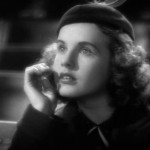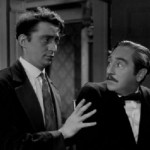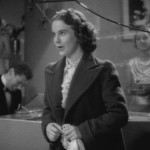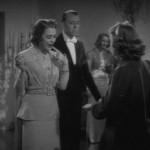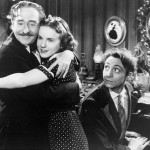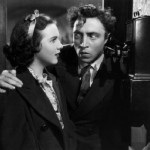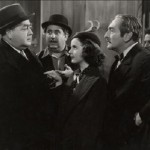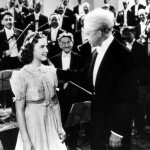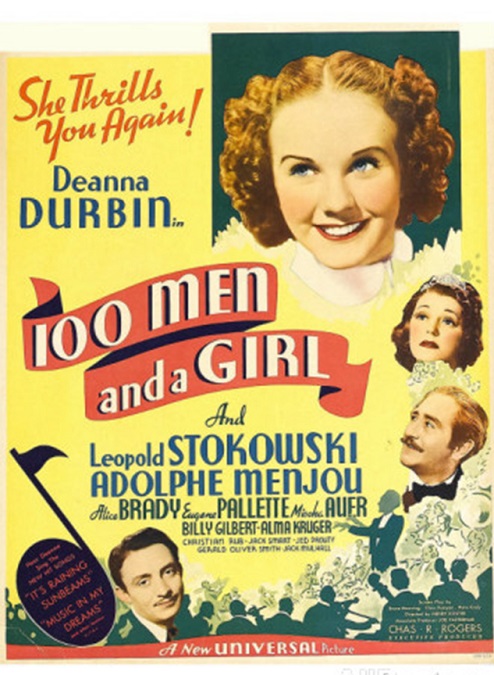
One Hundred Men and a Girl – 1937
This movie had to potential to be a great screwball comedy. It had a good cast of characters, misunderstandings and mistaken identities. The only thing it didn’t have was a big romance. But somewhere along the way, the ball was dropped. Somehow, the movie came across to me as annoying. I had to think about it a little but I finally figured out why. Once again, Hollywood committed the cardinal sin. Cute for the sake of cute is never cute. Never. The rule was broken, though not blatantly. It was subtle. But that made the sin no less deplorable. Here is what I mean.
The film, as I mentioned, was a screwball comedy. It starred Deanna Durbin as precocious young girl, Patricia “Patsy” Cardwell. She is supposed to be the eager young girl with the pure heart of an angel. She is sweet and innocent. She is adorable and has an amazing voice. What’s not to love?
Her father is John Cardwell, well-played by Adolphe Menjou. He is an out of work trombone player who is trying to get an audition with the world famous Leopold Stokowski. When he is unsuccessful and the two are on the verge of being evicted from their apartment for not being able to pay the rent, he is lucky enough to find the dropped purse of a rich woman. He uses the money to pay his rent and lies to his daughter, saying that he earned the money playing for the famous conductor.
Patsy finds out about the lie and takes the purse and the remaining money to return it to its rightful owner. So far it almost sounds like a serious drama. But when she meets the kooky rich woman, Mrs. Frost, played by Alice Brady, a hair-brained scheme is concocted on a whim in which a full orchestra of 100 unemployed musicians will be sponsored by Mr. Frost, played by Eugene Pallette.
Hijinks ensues. Now it all sounds like a setup for a great screwball comedy, right? But here is the problem. Deanna Durbin was over the top in an unbelievably annoying fashion. The character of Patsy was supposed to be a smart, fast-talking young girl. But she took that to mean that she was just supposed to say her lines as rapidly as possible. The result was that she was hyper-excited and super-talkative. Not only that, the lied, schemed, intruded on private property, ignored rules, destroyed property, and generally made a criminal nuisance of herself in her efforts to make the idea of the unemployed musician orchestra work. How sweet does she sound now?
I just wanted her to shut up and slow down. Fortunately, every now and then, she did when it was time for her to sing. Granted, she had a beautiful singing voice, which the filmmakers did their best to showcase. But such juvenile behavior would never be tolerated in the real world. I just had to keep telling myself that it was a screwball comedy. It is supposed to be silly.
But then it hit me. The entire film had Durbin dressed in the clothes of a child. She had ribbons in her hair and small, frilly little-girl frocks. All that, combined with her already bright, youthful face and brilliant smile, made for an extravaganza of cuteness. Even her excited and exuberant childish behavior was supposed to make her appear even cuter. Ugh! I was on cute overload! Then when she sang with the voice of a woman, because her voice was so mature and developed, it seemed almost disturbing. Here I am, listening to her wonderful, full voice and looking at the image of a child on the screen. My brain had trouble reconciling the two.
The best part of the film was Leopold Stokowski. I myself am a musician and I know a true conductor at work when I see one. He was so realistic because he wasn’t playing a character. He was playing himself. Granted, maybe some of his actions and decisions were not very realistic, but he played them well for the purpose of the plot. I especially liked the part in the end where Patsy sneaks all 100 men into Stokowski’s private home and they start to play for him. As they play he tries to resist conducting them. But being the true master musician he is, he can’t help himself. His hands start moving of their own volition and before he can do anything about it, he agrees to conduct them in a public concert. And of course, Patsy gets to sing an aria with them to close the performance. Would this really happen? Of course not. But hey, it is a screwball comedy, so why not. Best Picture nominee, though? I would say no. It was just too… average in its execution.
